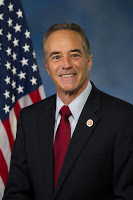STAFF REPORTS

WASHINGTON, D.C. — Earlier this week, Congressman Chris Collins highlighted his sponsored legislation, the Firefighter Cancer Registry Act (H.R. 931), during a Subcommittee on Health hearing entitled, “Examining Initiatives to Advance Public Health.”
“This thoroughly bipartisan effort takes the first step toward addressing the detrimental health effects of fighting fires,” said Congressman Chris Collins. “While common sense tells us that firefighters frequently inhale smoke and other harmful substances, we must know more about the link between specific chemicals and diseases in order to reduce prevalence. I’d like to thank Kevin O’Connor for offering his testimony and stressing how crucial H.R. 931 will be in preventing deadly health consequences for our first responders.”
The hearing on “Examining Initiatives to Advance Public Health”, which took place on May 17th, gave both Congressman Collins and Subcommittee witness Kevin O’Connor, from the International Association of Firefighters, an opportunity to stress the importance of H.R. 931 as it pertains to preserving the health of firefighters. Mr. O’Connor’s testimony to the Subcommittee on Health covered a wide range of topics related to a national firefighter cancer registry, including his insight on various ways fire organizations could partner with the CDC to collect data from throughout the United States. In addition, Mr. O’Connor informed Subcommittee on Health’s members about the current equipment and technology available to firefighters and how efficient they are in protecting firefighters from various types of cancer.
Click here to watch Congressman Collins introductory remarks (11:20-12:30) and his 5 minutes of questioning to Kevin O’Connor (1:20:45-1:25:42).
The Firefighter Cancer Registry Act would authorize $2,500,000 in federal funds from FY2018 through FY2022 to the Centers for Disease Control and Prevention (CDC). The CDC would utilize these funds to create a national voluntary cancer registry to collect data on cancer incidence among firefighters. The improved data records would include the status of the firefighter (volunteer, paid-on-call, or career), number of years on the job, the number of fire incidents attended, the type of fire incidence, and a number of other risk factors. The culmination of this data will be used to develop better protective equipment and prevention techniques for firefighters.
All WNY is made possible thanks to coffee and sleep deprivation.
We appreciate your readership. We like money, too.

